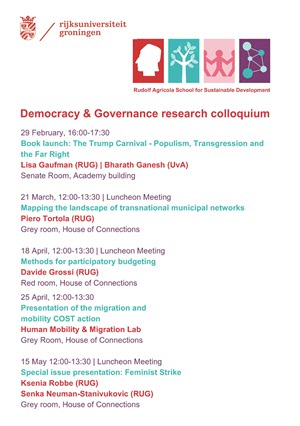Democracy & Governance colloquium - DAVIDE GROSSI: Fair methods for participatory budgeting'
| When: | Th 18-04-2024 12:00 - 13:30 |
| Where: | Red room, House of Connections |

Democracy & Governance research colloquium
Abstract
Participatory budgeting is one of the most influential democratic innovations. Born in the 90s in Brazil, it is now applied across the world as a vehicle to improve citizens’ engagement in local decision-making. Large European cities like Paris or Madrid distribute every year tens of millions of euros through participatory budgeting initiatives. In a typical participatory budgeting campaign (such as those also run in Groningen), citizens are asked to propose projects which, after an elaboration and validation phase, are put to the vote. Citizens can then indicate which projects they would like to see funded. These votes are then counted in order to determine which projects are funded within the available budget.
In this lecture we will see how the most used method for counting votes in participatory budgeting—the one that simply funds projects in decreasing order of support until the budget is exhausted—is actually unfair, potentially underrepresenting large parts of the population. I will then present alternative methods, which can be shown to guarantee a fair treatment of all participants.
These examples showcase how ‘nitty-gritty’ procedural details are actually substantial when it comes to the democratic quality of innovations such as participatory budgeting. I will claim that methods from computer science should become an integral part of the design of such innovations, in order for them to really advance ideals of democratic participation in our societies.
